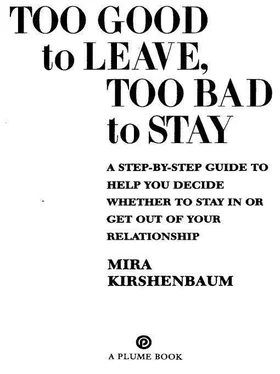Kirshenbaum, Mira - Too Good to Leave, Too Bad to Stay
Здесь есть возможность читать онлайн «Kirshenbaum, Mira - Too Good to Leave, Too Bad to Stay» весь текст электронной книги совершенно бесплатно (целиком полную версию без сокращений). В некоторых случаях можно слушать аудио, скачать через торрент в формате fb2 и присутствует краткое содержание. Жанр: Психология. Описание произведения, (предисловие) а так же отзывы посетителей доступны на портале библиотеки ЛибКат.
- Название:Too Good to Leave, Too Bad to Stay
- Автор:
- Жанр:
- Год:неизвестен
- ISBN:нет данных
- Рейтинг книги:3 / 5. Голосов: 1
-
Избранное:Добавить в избранное
- Отзывы:
-
Ваша оценка:
- 60
- 1
- 2
- 3
- 4
- 5
Too Good to Leave, Too Bad to Stay: краткое содержание, описание и аннотация
Предлагаем к чтению аннотацию, описание, краткое содержание или предисловие (зависит от того, что написал сам автор книги «Too Good to Leave, Too Bad to Stay»). Если вы не нашли необходимую информацию о книге — напишите в комментариях, мы постараемся отыскать её.
Too Good to Leave, Too Bad to Stay — читать онлайн бесплатно полную книгу (весь текст) целиком
Ниже представлен текст книги, разбитый по страницам. Система сохранения места последней прочитанной страницы, позволяет с удобством читать онлайн бесплатно книгу «Too Good to Leave, Too Bad to Stay», без необходимости каждый раз заново искать на чём Вы остановились. Поставьте закладку, и сможете в любой момент перейти на страницу, на которой закончили чтение.
Интервал:
Закладка:
By the end you’ll know which is true for you.
All that needs to happen as you read is that you trust yourself, take things a step at a time, and think of each question as an opportunity to find out what’s real for you. Often you’ll know the answer right away, but sometimes you may have to sift through your thoughts and feelings and memories.
Most people come up with their answers fairly easily, because that’s how these questions were designed. It’s no more difficult than when your optometrist clicks those lenses back and forth and asks you if you can see better the first way or the second way. Either one is better or the other is better or you can’t tell the difference: they are all valid answers. The point is that with the step-by-step approach all you have to do is come up with one answer to one question about one issue at a time.
The diagnostic questions here include everything that’s important to pay attention to in deciding whether to stay or leave. If it’s not in the questions, it’s not so important in deciding what’s best for you, and you can let go of worrying about it. So let’s get started.
STEP #1: THEY WERE THE BEST OF TIMES
You’ve probably put a lot of energy into thinking about the bad times in your iffy relationship, but in this first step I’d like you to think about the good times for a moment. The best time, in fact. Try to remember when you felt most comfortable, most satisfied, most optimistic about the relationship you’re in. It could have been the day you met, the time you took your first trip together, a special rainy weekend the first year you were married, a period when you were working together to achieve some joint goal. If you’ve been together a long time, don’t worry about being too thorough. Trust your unconscious to throw a searchlight on a “best” time even if it’s not the absolute best.
Now ask yourself:
Diagnostic question #1. Think about that time when things between you and your partner were at their best. Looking back, would you now say that things were really very good between you then?
This is a simple question. Were things between you actually very good when they were at their best?
What do I mean by “very good”? Some people, even in relationships that feel awful now, know that there was a time in the past when things were wonderful. They were in love, they were genuinely happy, they felt good about themselves when they were with the other—there was a kind of happy magic of warmth and connectedness. Their answer to question #1 is yes.
But other people realize that the “best” was never very good. Something was wrong. They’re usually referring to an empty, distant, tainted, painful quality at the core of their relationship, even back then. Their answer to question #1 is no.
Here are some things people have said describing “best” times that weren’t very good:
• “At the beginning I loved him very much and I thought we were close, but even then we’d have violent arguments every couple of days that completely drained me and spoiled everything.”
• “Our best time was on our honeymoon. We were happy in a way, but I now realize that all the pleasure came from the activities we did, not from being with each other. It was like having a really great vacation with a stranger.”
• “There was a period when we never fought, but we never spent much time together then or were close either.”
• “For the first couple of years sex was great—it’s how we got together in the first place—but we had nothing else in common and didn’t really care about each other.”
You probably have a pretty clear sense about whether, when things were at their best, they were actually very good or not. For most people whose relationships are iffy now, they were pretty good at one point. But for about ten percent of you, they were actually never very good.
Jennifer’s Story
In a moment you’ll see what your answer to question #1 means. But first, let’s put all this in the context of someone who was going through something like what you may be going through now.
Jennifer was thirty-six. She was an attractive woman who acted like she could make quick work of any problem you gave her. When she came to see me she’d been married for eight years. And for the last six she’d been in a constant struggle about whether to stay with her husband or leave him for good.
For all the time and brain power she brought to thinking about what to do—probing every strand and filament of feeling, every nuance of behavior, every hint of what the future might hold—she’d grown less and less clear over the past six years. And it was tearing her up inside.
With Jennifer’s training and ability, you’d think she’d be smart and knowledgeable enough to avoid this dilemma. She’d graduated from medical school in the top quarter of her class, had started out on a promising career as an oncologist, and had switched to psychiatry when she got tired of seeing people die and wanted to help them find a way to live.
Finding a Balance .You might think being a psychiatrist would have given Jennifer an edge in figuring out relationships. But it didn’t help: as you’ll see, it produced only more confusion. She couldn’t remember what started her ambivalence; maybe it wasn’t anything specific. But for six years her heart was burdened by more and more considerations that piled up without ever sorting themselves out or producing a resolution.
I don’t want to give short shrift to the mass of things Jennifer had to weigh, but this will give you the highlights:
• On the plus side, her husband, Don, was great with the kids, charming when he wanted to be, a good income earner as a computer executive; they shared some spiritual values, he said he cared about her, and he gave Jennifer the space she needed to do her work and be with her friends. She thought she still had some love for him.
• On the minus side, he was angry with her most of the time, picked fights with her, kept expressing his disappointment with her, kept trying to change her, had had an affair, and had once shoved her during a stormy argument after she’d shoved him. She didn’t think she loved him enough.
Maybe you look at these two piles of evidence and it’s clear to you which way Jennifer should go, but it was never clear to her. There were times when she vacillated minute by minute, and long periods when she seemed to have made a final decision that never turned out to be final.
Looking for Help. I was one of a long line of therapists Jennifer had seen, and my goal was to be the last.
Jennifer had also spent countless hours with friends talking about what to do. Most of her friends did what her best friend Sarah would do: listen endlessly, commiserate constantly, and try sincerely to be as supportive as possible. Sarah was never afraid to speak her mind, and Jennifer valued her honesty.
The problem was that Sarah didn’t have much to go on, and Jennifer knew it. Sarah was a wise and honest friend, but of course she knew less than Jennifer about what things were really like inside the relationship. And the truth is that Jennifer selected what she talked about. She shaded things. She made things sound worse than they were when she needed sympathy. She made things sound better than they were when she didn’t want to talk about them.
And Jennifer had done more than just talk to friends and therapists. She and Don had gone on many vacations to try to kindle a flame of caring and commitment. They’d made distance to try and cool things off. And from time to time Jennifer had interviewed lawyers about the possibility of divorce.
Читать дальшеИнтервал:
Закладка:
Похожие книги на «Too Good to Leave, Too Bad to Stay»
Представляем Вашему вниманию похожие книги на «Too Good to Leave, Too Bad to Stay» списком для выбора. Мы отобрали схожую по названию и смыслу литературу в надежде предоставить читателям больше вариантов отыскать новые, интересные, ещё непрочитанные произведения.
Обсуждение, отзывы о книге «Too Good to Leave, Too Bad to Stay» и просто собственные мнения читателей. Оставьте ваши комментарии, напишите, что Вы думаете о произведении, его смысле или главных героях. Укажите что конкретно понравилось, а что нет, и почему Вы так считаете.












